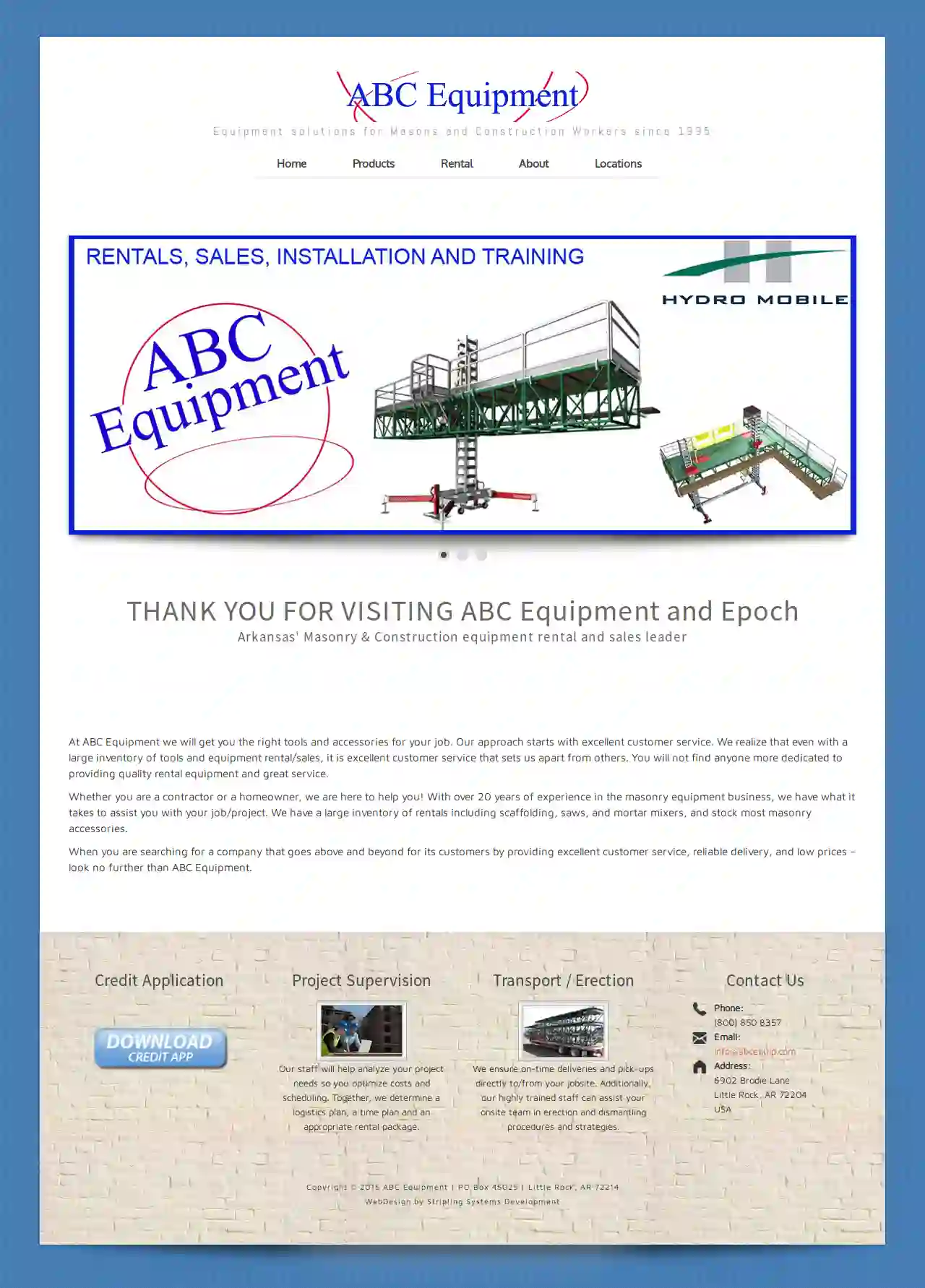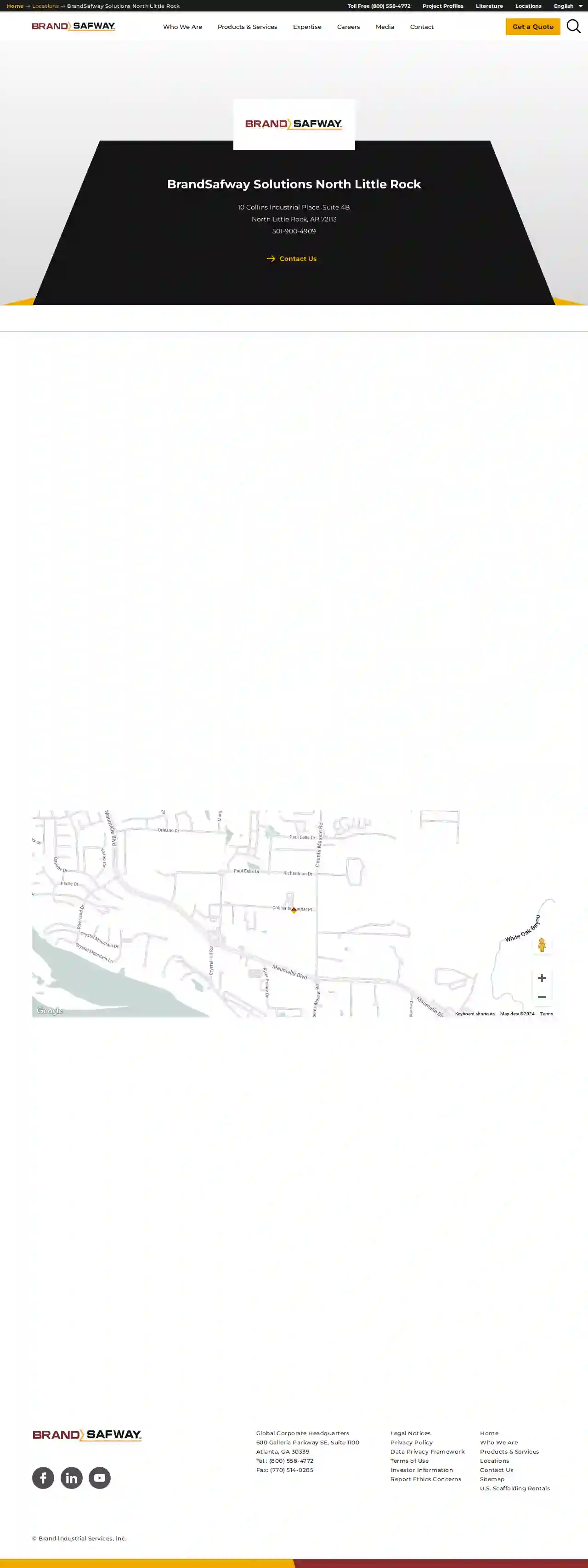Scaffolding Companies West Memphis
Top Scaffolding Builders in West Memphis
Receive multiple Scaffolding Companies quotes for your project today! Compare profiles, reviews, accreditations, portfolio, etc... and choose the best deal.

ABC Equipment
4.19 reviews6902 Brodie Lane, Little Rock, 72204, USABC Equipment: Your Partner in Masonry & Construction Since 1995, ABC Equipment has been a trusted provider of equipment solutions for Masons and Construction Workers in Arkansas. We understand the importance of having the right tools for the job, and we're committed to providing our customers with the highest quality equipment and exceptional customer service. Our team is dedicated to helping you succeed. We offer a wide range of rental equipment, including scaffolding, saws, mortar mixers, and a variety of masonry accessories. We also provide project supervision, transportation, and erection services to ensure your project runs smoothly. Whether you're a seasoned contractor or a homeowner tackling a DIY project, ABC Equipment is here to support you. We're proud to offer competitive prices, reliable delivery, and a commitment to exceeding your expectations. We're more than just an equipment rental company; we're your partners in success. Contact us today to learn more about how we can help you achieve your project goals.
- Services
- Why Us?
- Gallery
Get Quote
BrandSafway Solutions North Little Rock
North Little Rock, AR, 1234 Industrial Blvd, 72118, USBrandSafway is a leading provider of access solutions, including scaffolding, aerial work platforms, and forming and shoring. With a strong commitment to safety, quality, and customer satisfaction, BrandSafway offers a wide range of services tailored to meet the unique needs of clients across various industries. Their team of experienced professionals is dedicated to delivering innovative solutions that enhance efficiency and productivity, ensuring successful project outcomes.
- Services
- Why Us?
- Accreditations
- Our Team
- Testimonials
Get Quote- Un
Universal Dock & Door
Little Rock, US- Services
- Why Us?
Get Quote - Un
Universal Scaffolding & Equipment
4.33 reviewsLittle Rock, US- Services
- Why Us?
Get Quote
Over 2,353+ Scaffolding Companies in our network
Our scaffolding pros operate in West Memphis & surroundings!
ScaffoldingHQ has curated and vetted the Best Scaffolding Companies in West Memphis. Find a top & reliable pro today.
Frequently Asked Questions About Scaffolding Companies
- Traditional and highly versatile.
- Components (tubes, clamps, boards) are assembled on-site.
- Adaptable to complex shapes and structures.
- Requires skilled labor and more time for erection.
- Pre-engineered, modular components.
- Faster and easier to erect.
- Often has higher load capacities.
- May be less versatile for complex shapes.
- Work at Height Regulations 2005: Covers all work at height and outlines the need for risk assessments, competent erectors, and safe equipment.
- Construction (Design and Management) Regulations 2015 (CDM): Applies to construction projects and requires planning for scaffolding safety throughout the project lifecycle.
- British Standard BS EN 12811: Sets standards for the design, manufacture, and testing of scaffolding components.
- NASC (National Access & Scaffolding Confederation) Guidance: Provides industry best practices and safety recommendations for scaffolding.
- Steel: The most common material due to its strength, durability, and resistance to corrosion.
- Aluminum: Lighter than steel, often used for smaller projects or where weight is a concern.
- Timber: Used for decking platforms and some traditional scaffolding structures. It's less common now due to its susceptibility to rot and damage.
- Fiberglass: Used in specialized applications where electrical conductivity is a concern.
What is the difference between tube and clamp scaffolding and system scaffolding?
Tube and Clamp Scaffolding:
What are the safety regulations for scaffolding in the USA?
Can I erect scaffolding myself?
What are some common materials used in scaffolding?
What is the difference between tube and clamp scaffolding and system scaffolding?
Tube and Clamp Scaffolding:
- Traditional and highly versatile.
- Components (tubes, clamps, boards) are assembled on-site.
- Adaptable to complex shapes and structures.
- Requires skilled labor and more time for erection.
- Pre-engineered, modular components.
- Faster and easier to erect.
- Often has higher load capacities.
- May be less versatile for complex shapes.
What are the safety regulations for scaffolding in the USA?
- Work at Height Regulations 2005: Covers all work at height and outlines the need for risk assessments, competent erectors, and safe equipment.
- Construction (Design and Management) Regulations 2015 (CDM): Applies to construction projects and requires planning for scaffolding safety throughout the project lifecycle.
- British Standard BS EN 12811: Sets standards for the design, manufacture, and testing of scaffolding components.
- NASC (National Access & Scaffolding Confederation) Guidance: Provides industry best practices and safety recommendations for scaffolding.
Can I erect scaffolding myself?
What are some common materials used in scaffolding?
- Steel: The most common material due to its strength, durability, and resistance to corrosion.
- Aluminum: Lighter than steel, often used for smaller projects or where weight is a concern.
- Timber: Used for decking platforms and some traditional scaffolding structures. It's less common now due to its susceptibility to rot and damage.
- Fiberglass: Used in specialized applications where electrical conductivity is a concern.